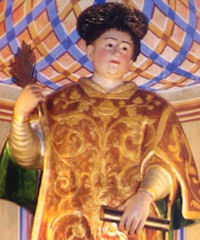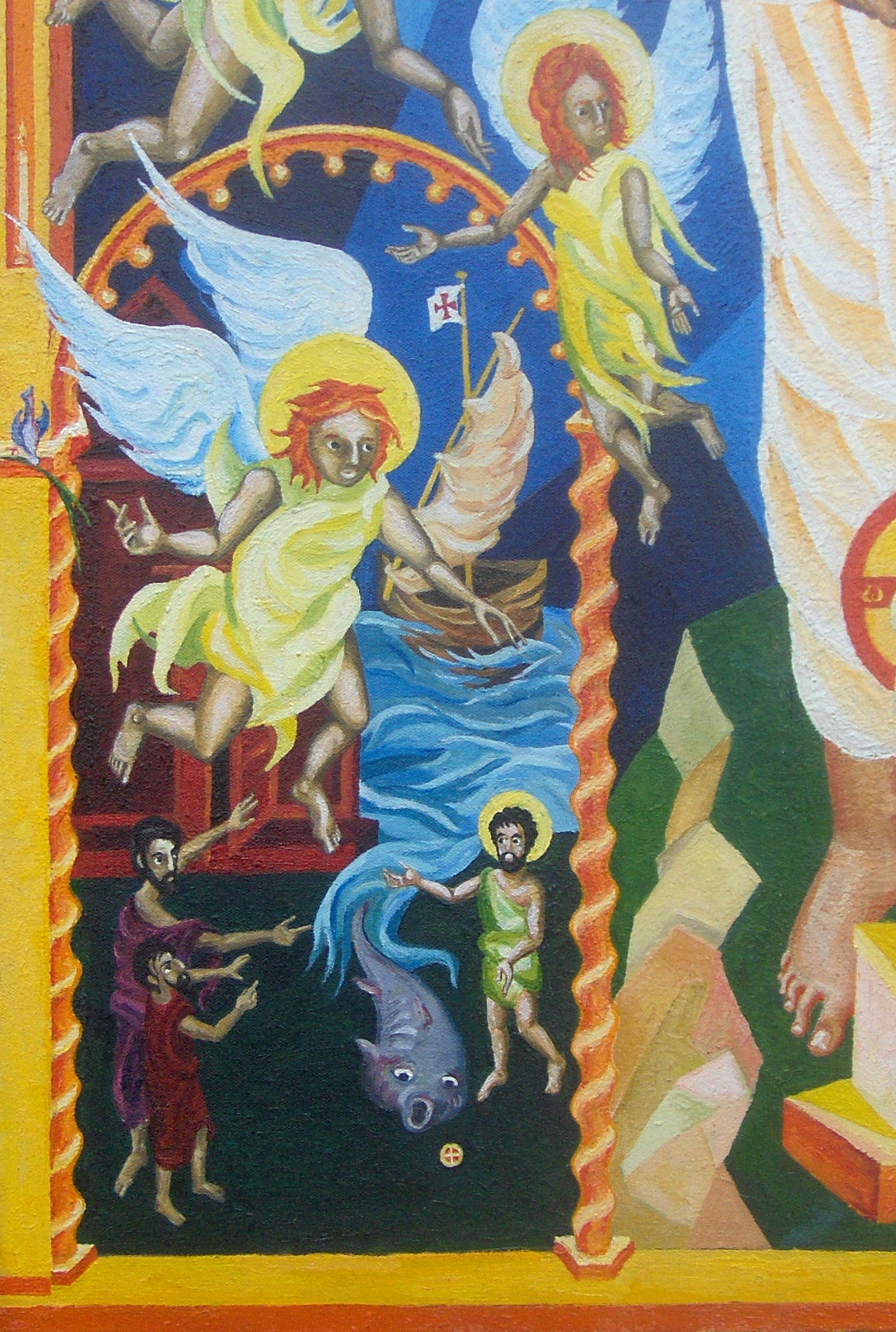
Daily Readings for: August 12, 2013
(Readings on USCCB website)
Collect: O God, who made Saint Jane Frances de Chantal radiant with outstanding merits in different walks of life, grant us, through her intercession, that walking faithfully in our vocation, we may constantly be examples of shining light. Through our Lord Jesus Christ, your Son, who lives and reigns with you in the unity of the Holy Spirit, one God, for ever and ever.
RECIPES
o Asparagus and Scrambled Eggs with Bacon
ACTIVITIES
PRAYERS
o Act of Abandonment to Divine Providence
LIBRARY
o “Everything She Had: The Widow’s Mite of St. Jeanne de Chantal” | Christopher J. Lane
Ordinary Time: August 12th
Optional Memorial of St. Jane Frances de Chantal, religious (USA)
Old Calendar: St. Clare, virgin; St. Euplius, martyr (Hist)
St. Jane was a married woman and a mother of seven children from Dijon, France. Her husband was killed in a hunting accident. In 1604, upon being deeply moved by the preaching of Francis de Sales, Jane asked him to become her spiritual director. She founded the Visitation nuns in 1610. Jane worked tirelessly helping the sick, and she convinced local political rulers to make special provisions for the sick and the bereaved. During the last years of her life, she experienced periods of spiritual aridity. She established eighty-five monasteries before her death in 1641.
According to the 1962 Missal of Bl. John XXIII the Extraordinary Form of the Roman Rite, today is the feast of St. Clare. Historically it is the feast of St. Euplius, a deacon, under Emperors Diocletian and Maximian. He was tortured for his confession of Christ and finally martyred by being put to the sword.
St. Jane Frances de Chantal
Jane Frances Fremiot de Chantal was the foundress of the Order of the Visitation of Mary. She was born in 1572 and came from a noble family, her father gave her in marriage to the Baron von Chantal in 1592. As mother she most zealously instructed the children in the ways of virtue and piety and in the observance of every divine precept. With great generosity she supported the poor and took special joy in seeing how divine Providence often blesses and increases the smallest larder. Therefore she made a vow never to refuse anyone who asked for alms in the Name of Christ.
The death of her husband, who was accidentally shot while on the chase (1601), she bore with Christ-like composure and with all her heart forgave the person who had killed him; then she acted as sponsor for one of his children in order to show her forgiveness openly. There was a holy friendship between her and her spiritual guide, Francis de Sales; with his approval she left her father and children and founded the Visitation nuns.
Thus, too, it should be with us—firm yet forgiving, and each at the proper place and in the proper measure. Our zeal must not make us hard, fanatic; neither may love degenerate into sentimentalism. In fundamentals, in faith, and in the commandments we must be firm, immovable, with no trace of tolerance; but in our contacts with men, patient, forgiving, tender, conciliatory. The Christian ought be firm and resolute as a father, mild and self-sacrificing as a mother. This tension between complementary virtues we find exemplified in a heroic degree in St. Jane Frances de Chantal.
Excerpted from The Church's Year of Grace, Pius Parsch.
"Love! love! love! my daughters; I know nothing else." Thus did Jane de Chantal, the glorious cooperatrix of St. Francis in establishing the Visitation of holy Mary, often cry out in her latter years. "Mother", said one of the sisters, "I shall write to our houses that your charity is growing old, and that, like your godfather St. John, you can speak of nothing but love." To which the saint replied: "My daughter, do not make such a comparison, for we must not profane the saints by comparing them to poor sinners; but you will do me a pleasure if you tell those sisters that if I went by my own feelings, if I followed my inclination, and if I were not afraid of wearying the sisters, I should never speak of anything but charity; and I assure you, I scarcely ever open my mouth to speak of holy things, without having a mind to say: Thou shalt love the Lord with thy whole heart, and thy neighbour as thyself."
Patron: Forgotten people; in-law problems; loss of parents; parents separated from children; widows.
Things to Do:
- Learn more about the Visitation nuns founded by St. Jane Frances; consider having a spiritual director. St. Francis de Sales, in speaking about the spirit of the institute he had founded with St. Jane, declares that it is "a spirit of profound humility towards God and of great sweetness towards our neighbor, inasmuch as there is less rigour towards the body, so much the more sweetness must there be in the heart." And because "this Congregation has been so established that no great severity may prevent the weak and infirm from entering it and giving themselves up to the perfection of divine love," he adds playfully: "If there be any sister so generous and courageous as to wish to attain perfection in a quarter of an hour by doing more than the Community does, I would advise her to humble herself and be content to become perfect in three days, following the same course as the rest. For a great simplicity must always be kept in all things: to walk simply, that is the true way for the daughters of the Visitation, a way exceedingly pleasing to God and very safe." Read the Treatise on the Love of God written by St. Francis de Sales for St. Jane and her sisters; donate food to the food pantry at your church, if you have more time volunteer to help.
- Read some of the letters of St. Jane Francis.
- St. Jane Frances was willing to change her plans when God asked her to, read Abandonment to Divine Providence by Jean-Pierre de Caussade online or purchase a copy, try to become aware of God's Will in the small contradictions you experience each day.
- Say the prayer of abandonment written by the saint.
- St. Jane Frances helped the poor and the sick, have your children construct a collage of the corporal and spiritual works of mercy (they can draw the pictures if none are available from magazines).
St. Euplius
On August 12, 304 A.D., during the persecution of Diocletian at Catania, in Sicily, a deacon named Euplius was brought to the governor's hall and staunchly professed his faith. With the Book of Gospels in his hand, he was called before the governor Calvisian and commanded to read from it. The saint read the passage: "Blest are they who suffer persecution for justice's sake, for theirs is the Kingdom of Heaven." Euplius then read the passage: "If anyone will come after me, let him deny himself and take up his cross and follow me." Questioned by the governor as to what this meant, the youth replied: "It is the law of my Lord, which has been delivered to me." Calvisian asked: "By whom?" Euplius replied: "By Jesus Christ, the Son of the Living God." With that, the governor ordered that he be led away to be tortured. At the height of his torment Euplius was asked if he still persisted in Christianity. The saintly youth answered: "What I said before, I say again: I am a Christian and I read the Sacred Scriptures." The governor realized that he would never give up his faith, and ordered him to be beheaded. St. Euplius died April 29, 304 A.D., praising God all the while.

